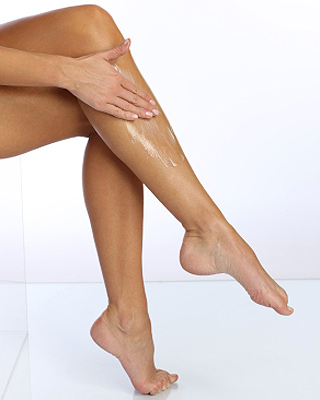How to Hydrate Your Skin
4 Key Factors
by Nancy Hearn, CNC
Note: As an Amazon Associate I earn from qualifying purchases.
If you value a youthful complexion and smooth skin, you will need to know how to hydrate your skin and retain the moisture.
Since your skin is about 30 percent water, keeping water in your skin can make a big difference in its elasticity, plumpness, softness, and resilience to environmental toxins.
Learning how to increase skin hydration can improve how your skin looks and feels and may decrease signs of aging.
In fact, studies have shown that decreased hydration is linked to greater quantity and depth of wrinkles.
There are four key factors to consider for optimal skin hydration—drinking enough water, using natural cleansers, protecting skin moisture, and taking extra care of your facial skin.
1. Drink Enough Water to Hydrate Your Skin
Skin hydration begins with body hydration. Research has shown that drinking enough water daily can increase skin density and thickness.
According to the Mayo Clinic, the average urine output for adults is about 1.5 liters daily. We lose an additional liter of water a day through breathing, sweating and bowel movements.
In addition, your body recycles about forty thousand glasses of water every day just to maintain normal physiological functions.
During this process of water recycling on a daily basis, your body becomes short of about six to ten glasses of water. This water must be replaced for proper hydration.
The most effective way to keep your body hydrated is to drink about half your body weight in ounces of water daily. In other words, if you weigh 200 lbs., you would want to drink about 100 ounces of water (roughly 3 quarts or 3 liters).
Learn more here: Drinking Enough Water Facts and Recommendations.
2. Use Natural Cleansers and Clean Water
Washing your skin too often or with cleansers that contain harsh chemicals can damage skin by washing out natural humectant agents and changing the pH of your skin.
To preserve water content of the skin, many dermatologists recommend using mild natural soaps, such as glycerine or castille soap, when taking a bath or shower.
When bathing or showering, use warm, not hot, water. Hot water is more likely to make your skin drier.
In addition, we highly recommend using a shower and/or bath filter that removes the basic water contaminants, especially chlorine, which also dries your skin.
See our top recommendations for Shower and Bath Filters.
3. Preserve Moisture in Your Skin
The best way to use a moisturizer is right after showering or bathing when your skin is still damp. Moisturizers can help prevent water loss and make your skin feel soft and smooth.
A good moisturizer should be non-sensitizing and hypoallergenic and should be made from natural ingredients, not harsh chemicals.
The hydration factors in a natural moisturizer should include humectants, occlusive agents, and emollients.
- Humectants are skin proteins that attract and bind water and can improve skin hydration. Effective natural humectants include vegetable glycerine, aloe vera, and hyaluronic acid.
- Occlusives form a protective layer on top of skin to seal water in. The most effective natural occlusive agents include lanolin, mineral oil, beeswax, palm kernel oil, castor oil, avocado oil, cocoa butter and shea butter.
- Emollients help to smooth and soften the skin by filling in tiny gaps in the skin where it may be cracked or flaked. Emollients are usually lightly oily, such as sweet almond oil, sesame oil, grape seed oil, argan oil, avocado oil, coconut oil, olive oil, as well as shea and cocoa butters.
Many years ago, my dermatologist told me that the most effective way to keep my skin hydrated was (1) to bathe or shower in warm water, (2) lightly towel dry so that my skin was still moist, and (3) then apply body oil instead of lotion.
Body oils will retain moisture in your skin better than lotions or creams. Just be careful of potential slipping when using oil.
4. Take Extra Care of Your Face
A simple daily facial care treatment is to cleanse, tone (as needed), and moisturize. When washing your face, use warm water instead of hot water.
Cleanse
Choose natural facial cleansers appropriate for your skin type. Avoid cleansers that contain parabens, fragrances, sodium lauryl sulfate (SLS), and other detergents.
Tone
Some beauticians recommend using a facial toner, such as witch hazel, after cleansing your face to help close the pores.
Facial hydration mists can also help tone skin, preserve moisture, and prepare your skin before applying makeup.
Mists are beneficial if they contain the right ingredients, such as natural plant extracts, humectants, emollients, as well as antioxidant vitamins like C and E.
Moisturize
Even though I have used facial moisturizing creams for years, recently I started using facial nourishing oils, along with a hyaluronic acid serum and I have noticed an improvement in my complexion.
Reference
The-dermatologist.com; Making the Choice; 2008.
Further reading . . .
Drinking Water and Acne - Is There a Connection?
Return from How to Hydrate Your Skin to Shower and Bath Filters

If you would like to reproduce or republish this article or any other article on this site, feel free to do so but please include a reference or link to the article at WaterBenefitsHealth.com.
Sign Up for Our Monthly
Newsletter
Visitor Comments
"This was the best and most straight forward info on the net yet. I asked a question and got an answer that made sense. Thank you so much!" - Linderlinder
FINALLY!!! I have been wondering about this for years with no 'solid' answer. This is exactly what I've been wanting to know! Thank you for this share..." by Andy
"Thank you for the information, Nancy. I appreciate it. Your article and findings are very helpful, referring to dehydration." - Carolyn
"Lemon water is one drink both my wife and I can't drink. It upsets our stomachs. We are in our sixties and in very good health—well, better health now that we drink about 2 liters plus of water each day. It has made so much difference to our digestive systems and recovery every day. Thank you for your website and effort." - Rod



